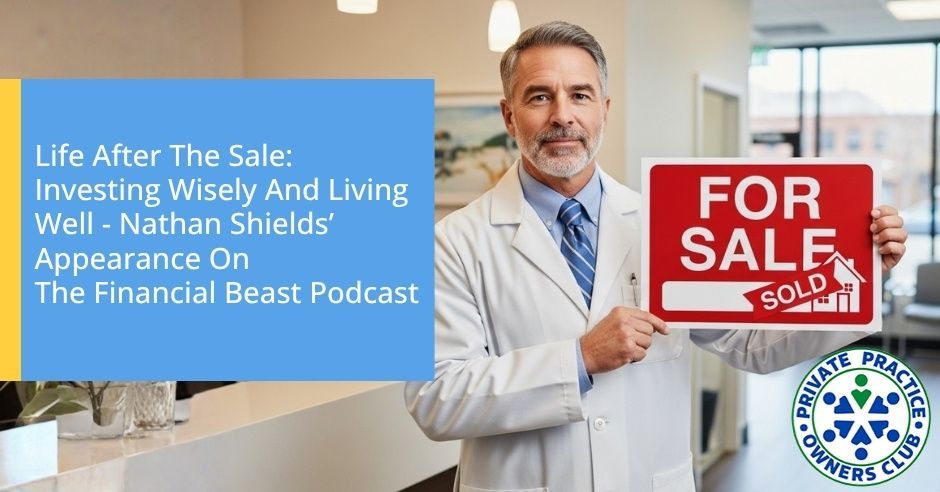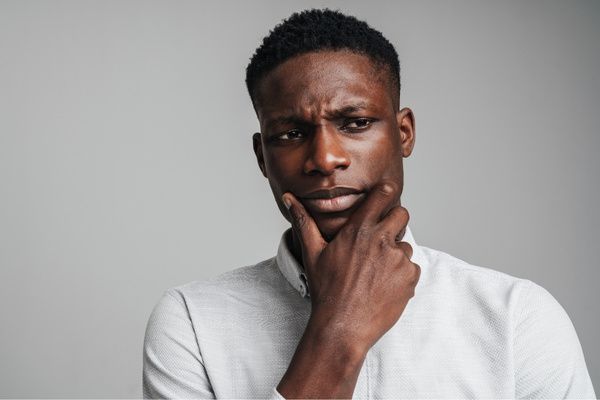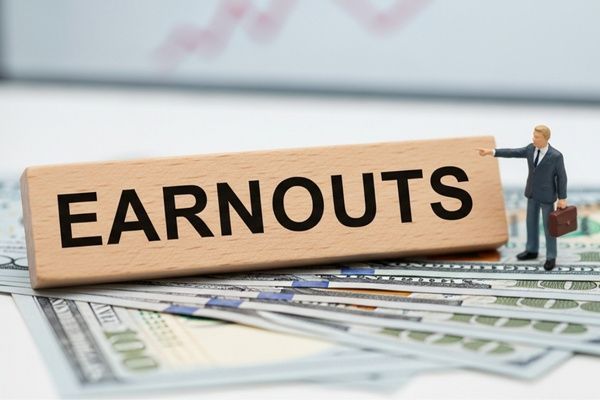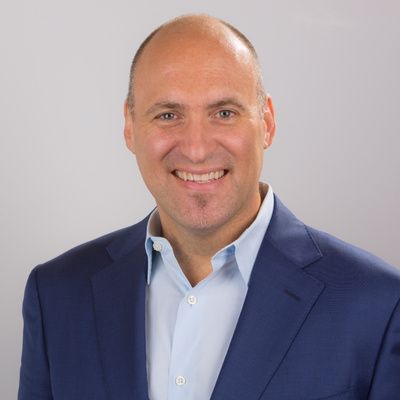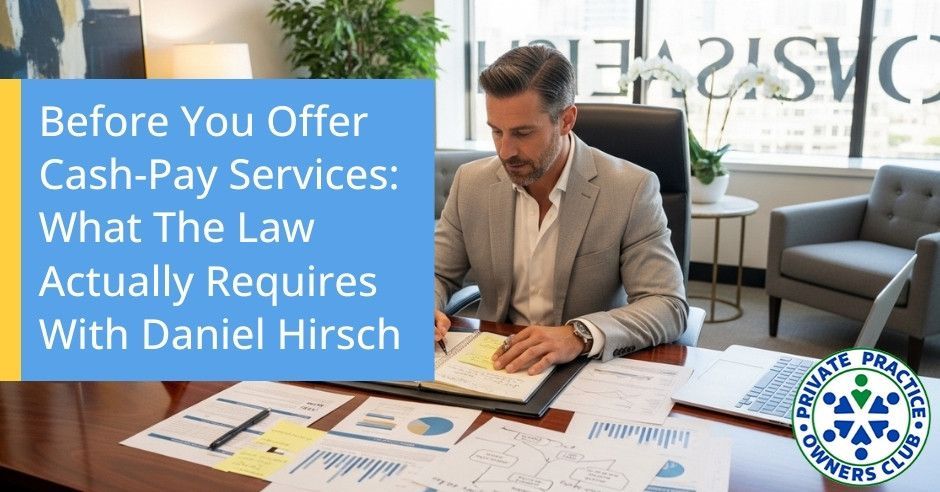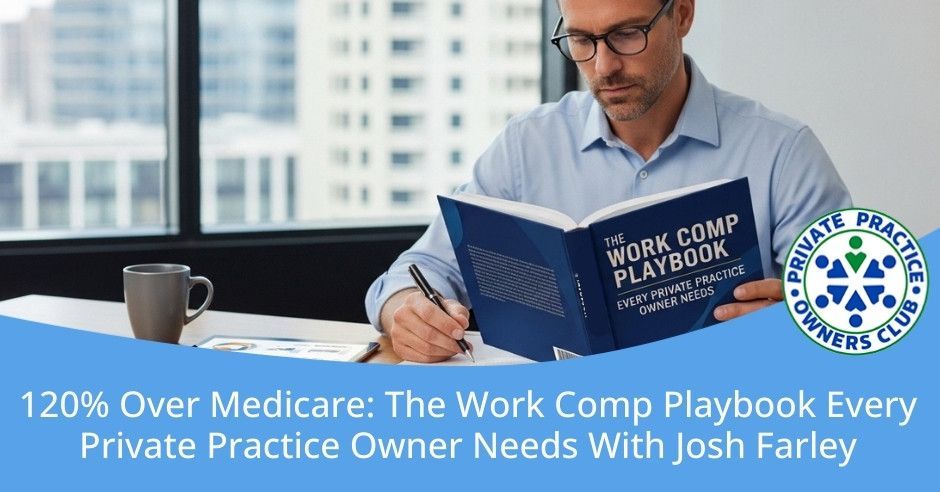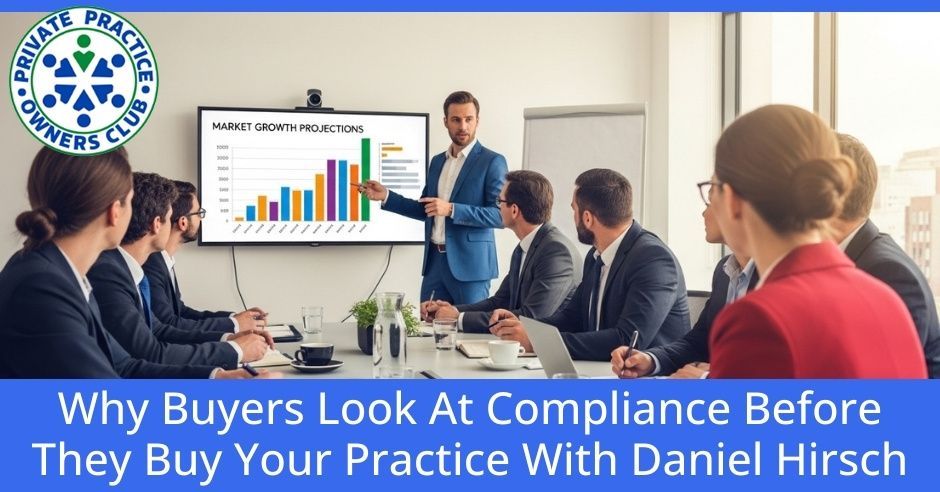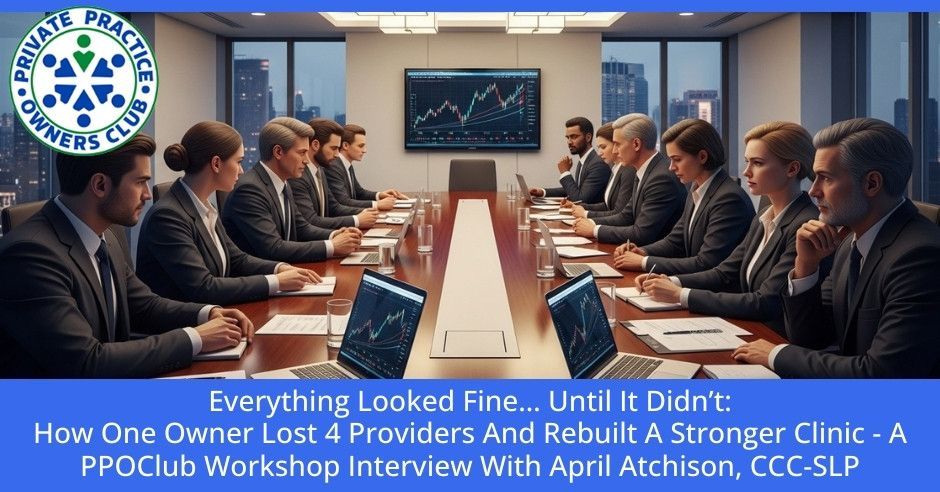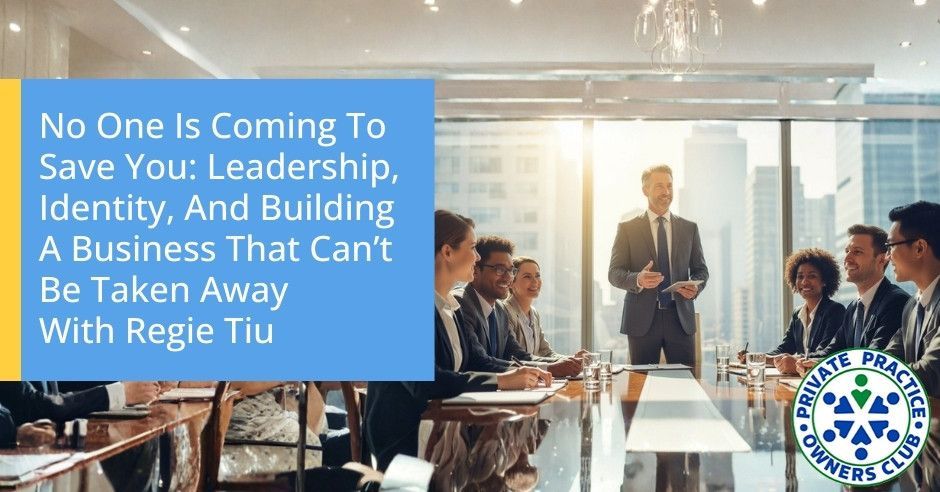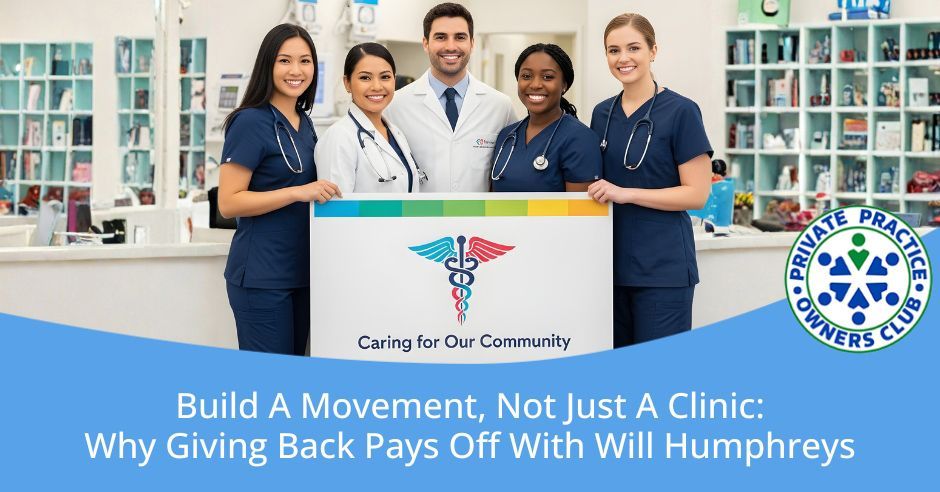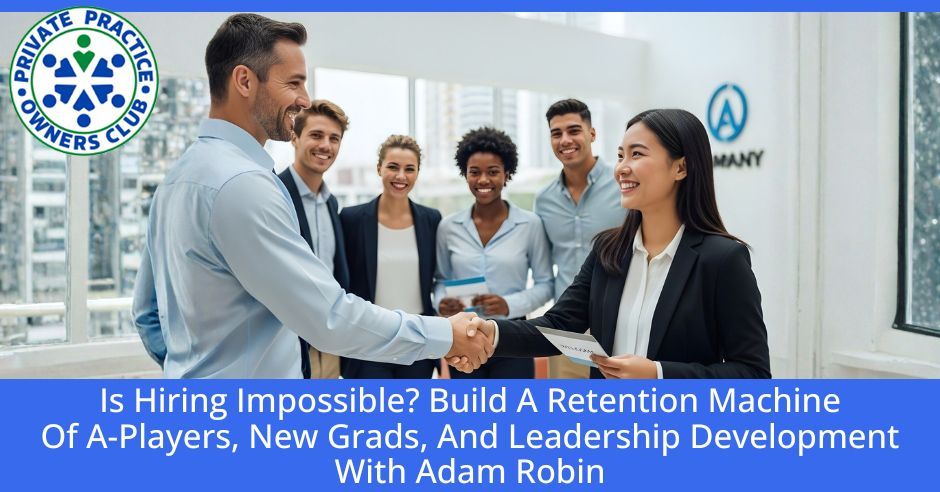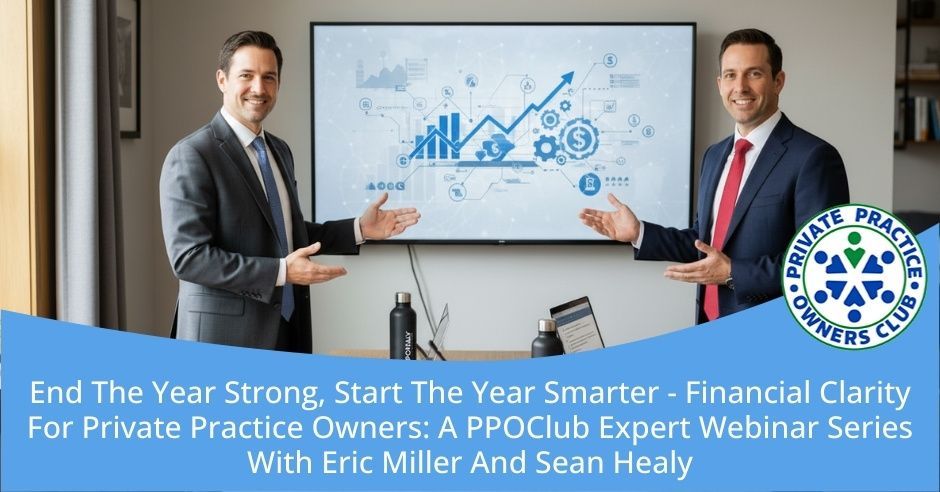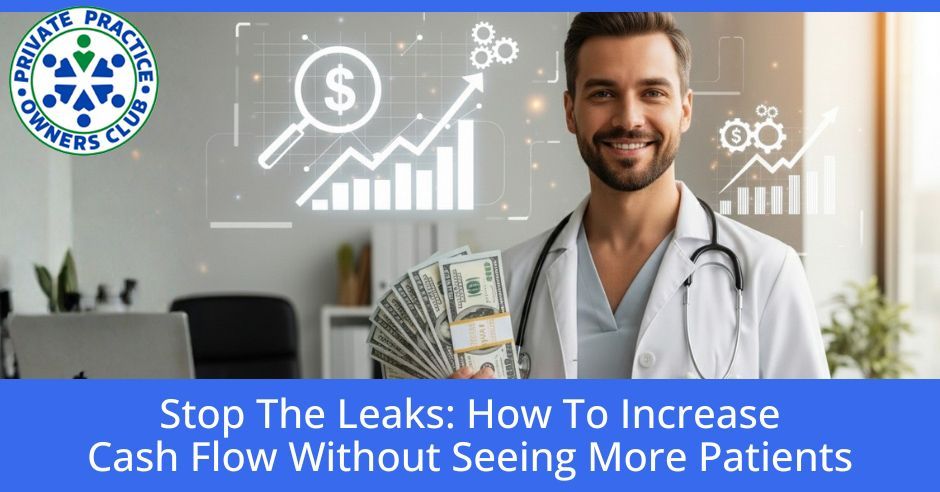Selling your practice is probably the biggest financial decision you’ll ever make — and once the ink is dry, the hard part begins: where do you invest the proceeds so your future actually works for you?
In this episode of The Financial Beast Podcast, host Eric Miller talks with Nathan Shields — ex-practice owner, real-estate investor, and co-founder of the Private Practice Owners Club — about life after a liquidity event. Nathan breaks down what he did well, the mistakes that cost him, and the operational and tax moves every seller should plan before they list.
They dig into:
● Why owning your clinic real estate can change the entire outcome of a sale
● Tax strategies and why you need your CPA and financial advisor in the room early
● Deal terms to avoid (earn-outs, misaligned post-sale roles) and how to sell from a position of power
● Cashflow vs. appreciation — how Nathan structured investments to replace income
● Lessons from private equity, hard-money lending, and 1031 exchanges
● The psychological side: how to plan for purpose and productivity after the sale
If you’re thinking about selling your practice (or want to plan ahead so you don’t get blindsided), this episode is essential listening.
🎙️ Learn how to convert a one-time payout into lifelong financial freedom.
👉 Connect with Nathan: nathan@ppoclub.com
👉 Want help planning an exit strategy? Book a call with Nathan — https://calendly.com/ptoclub/discoverycall
💡 Like the show? Subscribe, rate, review, and share — https://ptoclub.com/
Private Practice Owners Club helps owners sell from strength (not desperation). If you’re ready to maximize value and protect the life you want after exit, they’re the team to talk to.
---
Listen to the Podcast here
Life After The Sale: Investing Wisely And Living Well - Nathan Shields’ Appearance On The Financial Beast Podcast
This episode is a recording of a podcast episode that I did with Eric Miller of Econologics, who hosts the Financial Beast Podcast, and he asked me to come on and share my experience with life and investing after our clinic sale, which happened in 2018. I’ve shared that with you before on the show, and I don't know if I’ve gotten into as much depth as we do here on this episode. I'm taking the time to share with you all about what I’ve learned, what I went through, and what I'm continuing to do now post-sale. Hopefully, from my experience, you guys can learn a little bit of what I’ve done well and what I haven't done well, so that as you're looking for your future sale, you can prepare yourselves well ahead of time. I’ll won’t get into the details and let the podcast speak for self, and I hope you enjoy it.
---
Selling Your Practice: The Biggest Financial Question Of Your Life
Selling your practice is likely the largest and most important financial transaction of your life, and you don't get to do it again. Once the deal is done, the big question remains, where do I invest the proceeds? In this episode, I sit down with Nathan Shields, a former physical therapy practice owner. I'm going to talk about his journey after the sale, what he did right, what he'd do differently, and the key dos and don'ts when it comes to investing your practice proceeds. If you are thinking about selling or just planning ahead, you definitely don't want to miss this episode.
---
Welcome back to the Financial Beast Podcast. I am your host, Eric Miller, your BFFF, Best Financial Friend Forever. Eric Miller, thank you very much. In case you don't know who we are Econologics Financial Advisors, a registered investment advisor. We help healthcare owners acquire, control and invest their money so that you guys can live life the way that you want to live it and only see patients because you want to, not because you have to.
You can check us out EconologicsFinancialAdvisors.com and of course, please like, share, subscribe, all those things that everybody tells you to do every time that you're on a podcast. I'm excited talking with a good friend of mine. I’ve been on his show many times and I'm reciprocating because he's awesome and you've got a really interesting topic that I think is going to be beneficial for everyone. Of course we have the great Nathan Shields on the show.
Thanks for having me on. I appreciate the golf clap. Thank you so much.
Of course. I also want to thank you for the unbelievable event that you put on. It's probably reverberating in the industry. For those of you that don't know, Nate is one of the Co-owners of the Private Practice Owners Club. They put on an event where they had over 100 physical therapists and it was awesome, him and his partner Adam. It was a great event. Hopefully, you guys got a lot of great feedback from that.
Yeah, thanks for being there. You were a large part of it. You were not only a sponsor, but a featured speaker and so you brought a ton of value yourself. This is our second year doing the conference. Great experience. As you said, over 100 owners and practice administrators were there. Not just physical therapy, but occupational, speech, pediatrics, even some cash pay clinics were there. It was a really cool experience. We want to double what we did. You can always check out the Private Practice Owners Club website, look under Resources or the Events tab and find out when and where we're going to do our next event. 2026 was awesome. 2027, we're hoping to do even better and even double our attendance if we can. Thanks to your support and your promotion of it, it was great.
We just pondered over this topic for hours of what we're going to talk about.
So many late-night discussions.
It took us like about 30 seconds to come up with this.
I think you said, “How about we talk about this?” I was like, “Okay, if you want to.”
I know that you're an investment-minded owner, and it's always beneficial to talk with people, obviously, this being a financial podcast, talk about investing and because it's a favorite topic for a lot of people. You don't always think about it. I do like your viewpoints and your critical eye on how you invest money. Knowing that not every investment works out because it doesn't, and you're never going to shoot 10 out of 10 from the free throw line when it comes to investing. Of course, you've been through a sale of a practice, so you've been through that scenario of having proceeds or a lot of proceeds from a liquidity event and then trying to figure out what to do with that money.
We just want to talk about the good, the bad and the ugly of your investing experience and thought processes and such, because look at some point in time, everyone is going to have a liquidity event. Everyone's going to have to sell their practice at some point in time. You really want to make sure that you have an excellent plan of where you're going to position your money so that it can still provide for you in perpetuity. I think that's the basis of it.
Hopefully, me being on this podcast doesn't demonstrate some level of expertise. It's just simply that I’ve done it. I'm by no means the expert. I like numbers and I like thinking about it and I like talking about money. I appreciate your willingness to have me on, if for nothing else than to be an example of some things that you could and some things that you don't want to do, like learn from some of my mistakes and maybe I have a little bit of wisdom to share.
Let's talk about that. Let's go back to the point where you actually sold because that is when you were now in preparation for, “I'm going to get X amount of dollars.” What were some of the things that you were thinking about in terms of what I want to do with this money and what were like, “I know I'm not going to do this, but here's what I want to do to?” What was your thought process when you were approaching that time?
I wonder if you let me steer it to even further back prior to sale based on what I’ve learned since the sale. Is that cool? Coming into the money is one thing. Setting yourself up for true wealth is something that starts before that actual sale. One thing that stands out was, me and my partner, we’re big proponents and fans of owning the real estate in which we practiced. We were fortunate enough to do that in 2 out of our 4 locations.
Setting yourself up for true wealth starts before the actual sale.
The Pre-Sale Asset: How Owning Your Real Estate Creates Wealth
I had full ownership of one of the practices, real estate, and then we co-owned the real estate of another practice. That was semi-intentional. When I had bought it years before, I thought it was a good move, but not how good, I don't know. I just heard it was good a move. I think it's something that I'd learned from The Millionaire Next Door. I don't know if you remember reading that book from years ago, but these guys who owned auto shops found out that their auto shop real estate was worth more than their business 20 or 30 years later.
Taking that understanding, I bought the real estate and then, obviously, rented to myself. I had a separate real estate holding LLC and rented it to myself, and over time, I paid down the balance and it accrued, of course, and appreciation. When we sold, then I was able to still hold the real estate and the company that bought our physical therapy practices. I leased it back to them.
I not only gained in the windfall, but also the ongoing income of them leasing the spaces, which was a huge benefit. We now have this market rate lease agreement for seven years. It's actually worth a lot. I continued on like that. That was something that I was working on in the background. I never really thought about it a whole lot until the event came where we sold and saw the benefit and the asset that I had in the real estate there.
Do you still have that building?
Since then, I have done multiple 1031 exchanges on that. The monthly cash flow is now like doubled or tripled since that event. That's more of the Rich Dad Poor Dad concept, just going bigger and better over the course of time and that takes time. We sold in 2018, and I think I’ve 1031-ed it once or twice in order to do that. It just takes time to be able to do that.
Don't Go It Alone: The Critical Need For A Proactive Financial Advisor
That was a huge benefit for us. That all stemmed from work that I had done prior to the sale. Prior to the sale, yeah, I was doing some investments. I had some cash and made some really bad investments. Frankly, I had some financial advisors that were asleep at the wheel and didn't really help me with my investments. They just said I had a portfolio and I was too busy running my practices.
I highly recommend to all the people that we coach now that they find a financial advisor that is proactively communicating with you. I had financial advisors where I had to instigate the conversation. Once a year, I'd be like, “How's my portfolio doing?” They're like, “You want to learn about that?” “Sure.” We'd go to lunch and they'd say, “What do you want to know?” I'm like, “No, this is your time to report to me. You tell me. What is our plan for the next year?”
Find a financial advisor that simply and proactively communicates with you.
They're like, “We just keep doing what we're doing and I think you're doing pretty well.” I was so disappointed in that. If I would look back, those are the two things, getting into some real estate that you can be a part of and invest in, especially if you're the tenant well ahead of time. Secondly, find a financial advisor that actually helps. Their name isn't just on the paperwork, but they actually have a plan for you and teach you how to save on your taxes and also invest your money appropriately and make changes as they see fit. I hadn't experienced that type of financial advisor in the past. Even though I was making good money, I think I’ve lost hundreds of thousands of dollars a year on that.
Part of a financial advisor's job, and I get it, this is how most of them are paid, being one myself. The service model was always really weird to me, which was like we'll just meet once a year, “We'll just take a look at your little pie chart and make sure this is still your little pie chart here,” without really explaining it.
One of the basic principles I try to teach everybody is like, number one, you’ve got to know what you own and you got to know why you own it. I think the job of a financial advisor is to help explain that. “This is why you own this and this is what it is, and these are the characteristics of this investment, and this is what you can expect out of this investment.” No investment's not going to have its ups and downs and such. I think that's definitely part of the process. Unfortunately, too many people just don't do that.
Tax Mitigation Strategy: Why You Must Involve Your CPA Early
The other thing as it pertains to the sale specifically, was I remember talking to my CPA. I really hadn't involved in that much prior to the sale until it was happening. It was in motion where there were some end dates and all that in place, and I should have gotten my CPA involved sooner. I don't know, you tell me if this is a CPA thing or a financial advisor thing, but he told me, “If I had known that you were selling, I would've recommended a different type of sale that would've extended the tax impact over years.” Does that sound familiar? Do you know what I'm talking about? Versus taking it as a one lump sum in one year event.
You could probably try to defer it out somehow where you only get a portion of it. If you want to save on the taxes of the sale of a practice, you can't wait until after the sale is done generally to be able to do that, if you want to set up any structures at all. There are some. There's deferred sales trust and there's different capital gain deferral strategies that are out there that you can do to help mitigate some of that. As I said, certain irrevocable trust that you can set up prior to that. Those all have to be done prior to the sale. Most people are just trying to get through the sale, to be honest with you.
They're looking at it like, “I'm putting it on the market and I’ll tell my CPA about it later on.” If I were to give some advice, just get everyone involved very soon, as soon as you start thinking about it. If you're going to put it on the market, get everyone involved even prior to that. The financial advisor, the CPA,, even find the lawyer who's going to represent you and review the documents well ahead of time so that that you know all your options.
As things come at you have experts behind you to guide and direct and filter and review and all this stuff because you don't have that expertise. You don't want to be the stupidest one at the poker table. You want to have all these people on your side because you got some real smart people trying to buy your practice. Nothing against them. They're going to try to do everything they can to get the best deal out of you that they possibly can, even if it's to your detriment. You want to have these people well lined up. You want that team well lined up ahead of time.
That's excellent advice right there. Definitely have the team prepared prior to when you decide to sell. How nervous were you about the amount of money you were about to get?
I wasn't that nervous about it, frankly. When I got notification of what I was going to be in taxes, that was, that really sucked. I don't know if you would recommend this, but one thing that was recommended to me was to put some money in a Vanguard Charitable Trust to help offset some of the taxes. That has helped. I'm a man of faith, so I use it for tithing, and if my kids go on missions, then I'd pay it out of that charitable trust. That helped deferred some of the taxes. Otherwise, you're pretty exposed. It is what it is. It's 25% capital gains rate, plus the state.
I don't know if this is a donor-advised fund where you just put money in and then got a tax deduction for the money that you put in. That sounds like a donor-advised fund. I think, again, that would be something that a lot of people can do. How those work essentially is you put a big lump sum of money in there and it can stay invested. You don't necessarily have to give it away at that point in time but you do get the tax deduction immediately for whatever amount that you put in.
If you know you're going to be charitable in some regard, even if it's just tithing, it's worth it. All in all, I wasn't all that nervous about it. I probably should have been more nervous or I should have been more careful than I was.
What was the mistake that you felt you made? What were some of the bad investments that you made?
It wasn't necessarily a bad investment, but we were renting at the time and we paid full price for a house. There were reasons. That was one, I didn't really make a ton of huge investments at the time. I could have been better and more prepared as to what was going to go where and how much of it was going to go in the different places. Frankly, I didn't allocate it super well, but I did start putting money in. I'd allocate for my 401(k)s and I'd do some other investments. We found some private equity funds that we were part of. They did all right but I could have definitely been better about that.
Investing in private equity, people know when you have a certain amount of money, you are accredited investor and you get access now to these private deals. Just know the stats on those. There is probably like a 50% success rate on some of these things. For any of them, you just make sure you really trust the operator. You really have to trust the operator because the operator is the person that's running the money in those in those scenarios. We've seen that with some real people did real estate deals in 2023, 2024, and then rates went up. You're going to make some mistakes when it comes to investing money, that's for sure.
Beyond the Money: Planning For Purpose And Productivity After Exiting
We're pretty frugal as well as a household. That didn't really necessarily change how we spent our money. We didn't start blowing stuff on cars and magical trips and stuff like that. We didn't get into that stuff. This is one recommendation I’ll make. If you are going to sell, what do you plan on doing afterwards? I sold when I was mid to late 40s. I still got twenty years of productive life ahead of me. I was not totally clear on what my next thing would be. I frankly did have another. I also do diagnostics. I'm EMG certified and so I had a small EMG practice in Alaska at the time, and that did all right.
It generated some money, but it wasn't like a full-time gig. I’ve been working for the past few years to figure out what's my next thing. I’ve got some productive life ahead of me. What is my next thing? Part of, frankly, being a man is my self-esteem is tied to what I produce. My self-worth is tied to what I produce. That's been a struggle. Psychologically, I found some things. I got into coaching and I can make some extra cash there. It wasn't a full-time thing, so I had downtime. I guess I say all this to help people understand that you do need to consider what your life looks like after a sale.
What are you going to do if you want to produce? What does that production look like? Where are you going to find it? Where are you going to find fulfillment? Where are you going to spend your time? You can only golf or play pickleball for so long for a week before you actually feel like you need to get back to work. Do something productive. That's something that I experienced. As I talk to people who are considering selling, that is one of the first things that I bring up “What are you going to do afterwards? What does that look like?”
Yes, you get this bunch of cash, but if you also don't have some production on the backend, you're just going to whittle it down over so many years and it'll probably go faster than you think. Especially if you make some poor investments, which you probably will, then you need to just consider what that backend looks like.
That's really amazing advice. I think that you've found, especially with what you and Adam are doing right now, something that's really purposeful for you. It appeared that way on stage that you really found a groove here of something that you really enjoy. I think that that's important, that you have to have that because you own a practice, you're going 180 mile an hour, and the day that you sell, all of a sudden, it's like, “I don't have to worry about this anymore.” What's going to replace that activity that allows you to get up and go? I think that's excellent advice right there. Make sure you guys have a purpose.
The Deal Breaker: Prioritizing Deal Terms Over The Dollar Figure (Avoid Earn-Outs!)
Since we're talking about the sale of practices, and I'm sure you guys provide a ton of this advice because you've seen a lot of people exit, it's just the terms of a deal are almost more important than the dollar figure. We had been approached three times to sell with letters of intent to purchase our practice. Three times before we actually sold. We recognized that the terms of those deals just didn't match up. We didn't want to sell and then go and then live as clinic directors. You do like a 70-30 buyout and but then you have to stay on at this salary, at this level of production as a clinic director for the company that you just owned. It's like you're stepping back down into the organizational chart.
We didn't want to do that. There were some earnout options that were presented on in LOIs. From what I'm hearing, and you probably have your own opinion on it, but earnouts are not the best way to sell a company because those numbers can get adjusted, unfortunately, to your detriment. Earnouts are definitely not recommended.
Those are all things that we had seen and said, “No, thank you,” on before we found the right buyer. Frankly, if we agreed before we got the letter of intent, if you meet these terms, or we said to ourselves if that letter of intent meets these terms and this dollar figure, then that's something that we'll consider. That was the only reason why we did sell at the time.
That makes sense. You're right, I think the terms of the deal are of uber importance. You’ve got to remember, if you guys make a decision to sell the practice, it's because, probably, the game is up. Why would you tie your future income for you to have to sit there and work and slave and fret and worry? You can do all that and own the practice. These earn out deals, I just can't stand because it's rarely that I’ve seen them work out.
I’ve had too many friends do something like that where they stay within the organization, and I can understand staying in the organization for a transitionary period of time, for 6, 12 months, something like that, but at the end of those 12 months, we are done. People who have had to stay on for longer periods, not only just to transition, but also to earn the extra, I don't know, 10%, 20%, 30% that was promised to them at the initial sale and meet certain productivity numbers, the value no longer aligned. The processes are completely different and they just end up being miserable. I’ve just witnessed a few too many of those.
They're completely avoidable.
I'm sorry, that's not totally in the investment realm.
Post-Sale Investing: Why Cash Flow Is King For Replacing Income
That's part of the whole exit process. I do want to get back to investments. Right now, when you're investing money, are you more interested in the cashflow that it provides you or the potential appreciation that you're going to get on investment or is it a bit of both?
This is just Nathan. It's not sound financial advice, by any means.
I promise you right now, Nathan, you are not going to get sued. Nathan is not a financial advisor, nor is he providing you any financial advice right now. Purely just my own interest.
I don't have a full-time job, so I am very interested in the cashflow that I'm getting from my investments. Frankly, the stock market has a place in my portfolio, but it's probably small and smaller than my financial advisor would like to see, but not that that's a good thing. Based on what's happened over the past few years, I probably should have been much more in the stock market than I was, seriously.
I’ve done some 1031 exchanges on real estate. I like real estate for some reason. I especially like commercial real estate, not just commercial real estate, but commercial real estate medical offices in particular is where I have unintentionally stumbled into simply because that's what I'm a part of. Most of my commercial investments have some medical component to them, which cannot be outsourced. That's not going to go virtual anytime soon.
People have to be in person for those. That's why I like it. I like the appreciation of it. I like the tax benefits. That's where my focus is, more on cashflow because, like I said, I don't have a job or a salary that's providing for me. Frankly, we can survive on the cashflow for my commercial properties and be just fine. I want to increase those even more as we go down in the future.
If you start looking at medical facilities and things like that, and I don't know if there's corporate leases or who owns the buildings or whatever or who owns the practice inside there. Typically, when you have private equity groups or big corporations that are just leasing the buildings, they're great renters. You're going to get 5-to-10-year leases. They're going to renew every five years.
You’ve got to remember, these people do not ever want to have any blips. They don't want to have, “We defaulted on this,” or anything like that because it looks bad on them, very bad. This is why I really encourage people to try to own their practice real estate if they can. It's not always possible, I get that, but if you guys really can, it really is a pretty wonderful source of income long term for you.
It's worked out well for us, like I said, almost accidentally in that regard, so I'm grateful for that. It's something that I can continue to build off of. I actually was looking at some of my commercial properties, looking at, “When is the lease up for some of the major tenants? When would be a good time to put that on the market again?” Especially if interest rates are going to go down, they might be more attractive and a higher price, and I can then 1031 exchange those into something that cashflows even more.
Investing in the stock market, do you have a basic philosophy of that?
Learned because I didn't do it. Stick to some stock index funds. I look at some of the funds or some individual stocks. I should have in the past put more into just the index funds. Maybe you can decide what percentage to put into individual stocks because those will outperform if you pick the right ones. There were some that I invested in that I pulled out. I look at those now and they're doing very well and I'm like, “I should have just trusted myself on those things.”
I think the basic of that is if you're going to invest in stocks and such, you also have to know that no one else knows what the future prices are going to be of any of these things. There's some predictability there or probabilities, but we don't know. Buying important profitable companies, generally speaking, is going to be a positive outcome for you. It's okay to speculate.
I got a friend of mine that’s like, “I just bought CCP.” I'm like, “Do you even know what that thing does?” “No, but it just went up like 400%.” Of course, it never shows the losses that they have on the portfolio, but there's room to speculate for sure. You should, because it scratches that it's that people have, but compartmentalize your money and I think you've done that.
Not that I would give myself this advice, but there are people who want to play in the stock market. This is what I have done with some of my proceeds. Now I have this cash, I want to look at this investment vehicle. I really tried to get into self-storage at one time. I'm like, “I'm not just going to go out and try to buy a self-storage unit. I'm going to buy a coaching program that can teach me all the ins and outs of buying self-storage and how to put an offer together, how to do due diligence, how to find it. You name it, all the ins and outs of self-storage so that I'm not just going into it blind.
I'm a big proponent of investing in coaching. It has transformed my life. Our purpose with Private Practice Owners Club is to transform the lives of others through coaching. I live that experience myself, and I can't tell you how many hundreds of thousands of dollars I spent on coaching to learn more about these areas in which I'm investing or learning about investing. I even have a business coach right now because I have this new idea I want to put together to benefit practice owners and he's helping me flesh that out.
If you're going to get into investing after a sale, get some coaching. There are programs out there that will teach how to be a day trader or they'll teach you how to invest properly. If that excites you, then invest in the coaching to do it. I frankly get more excited about real estate stuff. I can see my coaching investments have been more related to what would be real estate investing.
Have you ever done any private lending or anything like that?
Yeah, I’ve actually done quite a bit of hard money lending to contractors. That's something that worked out well for me and it wasn't bad. There were some sketchy times. There are ways people who will teach you how to do hard money lending. It's not that all that hard, frankly. You don't need a lot of coaching on that. You want to set it up in such a way that you are lending such that if they defaulted, it actually you get benefit you. If you could set it up such that you would prefer that they default, then that's a great situation. You don't want to get stuck with something that's underwater.
I did that for actually a few years in Alaska. I had some contractor friends that were looking for cash to build their homes. We set up some hard money lending and you can get some good interest return on those, 10% to 12%. These are usually backed by the hard asset of the real estate, which is nice. I did do that for a few years and it worked out.
Anything in like gold, silver, crypto. Have you gotten into any of those?
I think my partner figured out that if we had invested our money in crypto back in Bitcoin in 2018.
You'd be worth probably $100 million.
I wouldn't be talking to you right now, Eric, for sure. I'm just kidding. I'm not above that.
I wouldn't have blamed you.
You might not even recommend this, but what I'm doing right now is I lost on the getting on early on the Bitcoin bus. Even though I got excited about the technology back then, 2019 or whatever, I didn't invest in it, but now, I put like $100 a week into Bitcoin.
Dollar cost average.
I’ve been doing that for maybe a year. $100 a week doesn't mean much. That's all I’ve done with Bitcoin right now.
Wealth Principles: Concentration to Build Wealth, Diversification to Keep It
Here's one thing I will say. The best financial successes come from concentration. What I mean by that is, for most of you guys out there that own your practice or your practice real estate, you are concentrated. Most practice owners that were probably at your event or we talked to, 70% to 80% of their net worth is in their practice and in their real estate. That's where it should be. You guys don't need to get so hung up on diversification or at least some of these terms that you hear from guys like me right away. I really want you to focus on building your practice, building it up, because you're concentrated.
That's how you actually are going to get wealthy. Now, when you actually do have the liquidity event, that's when you start looking at diversification at that point in time because concentration will create a financial success. Diversification will help you keep your wealth over a longer period of time. I guess that was one of my points. Make sure that you don't get too distracted, so to speak, on some of these outside things. Really focus on how to build up that practice, especially right now. Physical therapy is a good business if you know what you're doing.
You want to stay within your scope of expertise and build that up. I’ve found that when I’ve made my mistakes, it's been a couple of things, when I’ve gotten outside of my expertise thinking I knew more than I did and trusted more than I should have, frankly. The other thing was I invested in people that I hadn't gained a relationship with significantly, or they were not in my immediate geography.
Stay within your scope of expertise and build that up.
When I was doing some of the hard money lending, it was easy because I could drive to each of these properties and view progress on the property at any given time. Where I’ve gotten really stuck is when I invested in something out of state through a mutual friend who's like, “I’ve got this guy who's doing great things in this other state. He's needing some cash.” I did one deal with them and it was going all right, but hadn't fully paid off before they came at me with, “We could use some more money for this other property.” I got stuck on that one, frankly, and I lost some money and I'm still dealing with it two years later.
I could maybe break even two years later, get my money back, but it's been a pain in the butt. I knew better. I trusted sources and it wasn't my immediate geography. I really didn't do my due diligence. I trusted someone else's due diligence on those properties. I got out over my skis. That's something that I’ve seen personally in my own life now, but also in other people that I know who have lost a lot of money either while they were practicing, these were like MDs who had cash or after they had exited.
They just got into like other investments that they didn't know a lot about, and they just thought it would be this cash cow. They didn't know much about the ins and outs and details of that investment. It's one thing to diversify and, but do what you know. If you're going to invest it, it's got to be not only in somebody who has started a private equity fund and has done private equity funds in the past, that's not enough. You’ve got to know what they're investing in, what those returns are and what the industry's like, and what the market's like. In that case, maybe just trust your financial advisor instead of these other people that are coming at you for money.
That's good advice. I think we'll end off right there. All right, I appreciate it. The great Nathan Shields. How do people get ahold of you, Nathan?
You can always email me, Nathan@PPOClub.com. We also have the Facebook group, Private Practice Owners Club. We have the website, PPOClub.com. It's easy to reach out to us and even set up an appointment to talk to us on the website. You can schedule an appointment to talk to us. We're all about helping owners really gain control of their companies so that they're able to experience profit and freedom. If they are going to sell, they're selling from a position of power and not from a position of weakness and like, “Just get me out of here.”
You'd rather be selling from a position of, “This thing is making me a ton of money relatively passively. I could sell, I don't have to sell, but if you're going to buy it, you're going to pay a lot.” Be in that position versus, “Can you just take it off my hands?” Our whole goal is to help owners get to that point.
Beautiful. All right. You guys put on great events and I can't wait to see what you guys do next year. Thanks so much, Nathan.
Important Links
About Eric Miller


